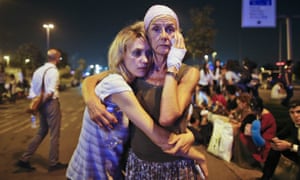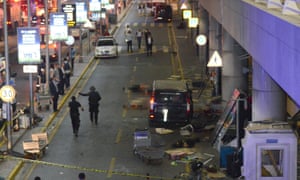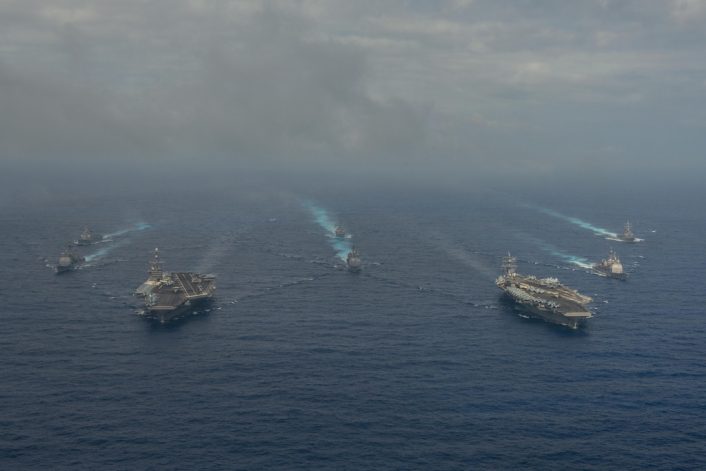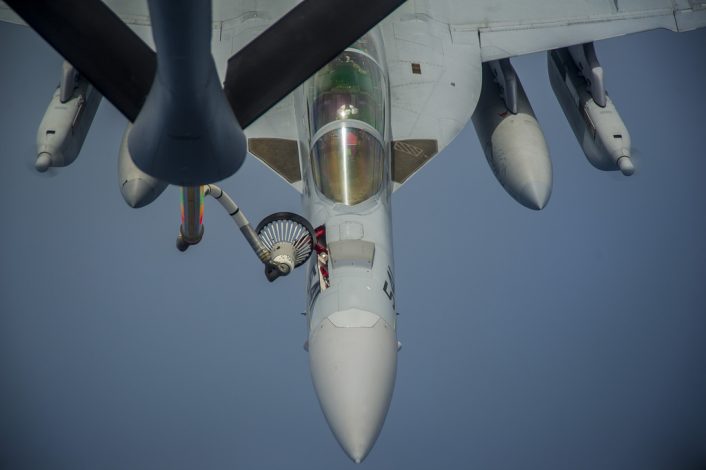Shortly before the blasts, assailants armed with AK-47 rifles became involved in a firefight with security and police near the airport’s x-ray security checkpoint.
The gunmen then detonated what are believed to have been suicide bombs. Three attackers died on the scene, said the Turkish prime minister, Binali Yıldırım.
By Wednesday morning, 18 bodies had been identified, including a young married couple working in ground services, several tourism guides and one taxi driver.
The Istanbul governor’s office said 23 Turks, 10 foreigners and three dual nationals were among the dead. Turkish officials said five Saudis, two Iraqis, an Iranian, a Chinese, a Jordanian, a Tunisian, an Uzbek and a Ukrainian were killed in the attack, and Turkish national broadcaster TRT reported that five of the dead were police officers.
The governor’s office also said at least 239 people were wounded in the attack, and that 109 of those had been discharged from hospital by early on Wednesday afternoon.

Iran’s Tasnim news agency quoted deputy foreign minister Hassan Qashqavi as saying five Iranian nationals had been injured in addition to the person killed, while the Ukrainian foreign ministry said a second Ukrainian was injured. The Saudi embassy said seven of its nationals were among the injured.
In a press conference in Istanbul on Tuesday night, Yıldırım said: “No matter where the terror comes from, our country is strong enough to fight against this terror. I call on every citizen to act in unity and stand by each other.” He said that by 2.22am local time air traffic was “back to normal and flights are resumed”.
A witness told Reuters that before the explosions one of the gunmen opened fire at random as he walked through the terminal.
“He was just firing at anyone coming in front of him. He was wearing all black. His face was not masked. I was 50 metres away from him,” said Paul Roos, 77, a South African tourist on his way back to Cape Town with his wife.
“We ducked behind a counter but I stood up and watched him. Two explosions went off shortly after one another. By that time he had stopped shooting.”

“He turned around and started coming towards us. He was holding his gun inside his jacket. He looked around anxiously to see if anyone was going to stop him and then went down the escalator ... We heard some more gunfire and then another explosion, and then it was over.”
Security camera footage circulating on social media was said to show the moment one of the attackers was shot by a security guard. The footage, which could not be verified, showed the assailant dropping what appeared to be an assault rifle before collapsing to the floor. Seconds later he appeared to activate a suicide bomb.
“There were the sounds of gunfire, it was like thunder, then there was a fireball everywhere,” a taxi driver, named as Fatih, told CNNTurk. “My front window blew out, the car in front of me was turned into scrap.”
Fatih said that at the most two minutes passed between the gunfire and the explosion.

President Recep Tayyip Erdoğan called on all governments, especially in the west, to join forces in taking a “firm stand against terror”.
“The bombs that exploded in Istanbul today could have gone off at any airport in any city around the world. Make no mistake: for terrorist organisations there is no difference between Istanbul and London, Ankara and Berlin, Izmir and Chicago or Antalya and Rome.
“Unless all government and the entire mankind join forces in the fight against terrorism, much worse things than what we fear to imagine today will come true.”
Turkey’s justice minister, Bekir Bozdağ, told parliament in Ankara of the attack.
“I harshly condemn those who executed this terrorist attack, and those who gave the orders for it,” Bozdağ said.
Jared Malsin, a correspondent for Time, tweeted from the scene: “Hundreds of travellers now streaming out of the airport. Some saying they were trapped inside for 2+ hours … several witnesses confirming two separate explosions, the second one triggering a stampede inside the arrival hall.”
One witness, whose name was given as Omar, told TRT that his brother was wounded in the explosion at the arrivals hall as he was fetching his luggage. Covered in blood and in obvious distress, Omar described hearing both “the explosion” and “a lot of gun[fire]”.
He ran inside to look for his family, he said, and saw his brother lying on the floor. “I don’t know what to do,” he said.
There were only a handful of people at the stop of the Atatürk airport transfer buses in Taksim on Wednesday morning, but drivers said it was “business as usual”, and that normal service had resumed after the reopening of the terminal.
Engin Sürer, a taxi driver, said he had driven away from the international terminal about 30 minutes before the explosions and said he was still shaken by the attack. “I am not afraid to work, but of course I am nervous. I would have never thought that such an attack would be possible at the airport.”
He said that he had not been able to reach all of his colleagues on duty at the airport at the time of the explosions, one of which occurred near a taxi stand outside the international terminal.
Taxi driver Eftal Erdin, 55, said that he was angry after news circulated on social media saying that taxi drivers asked for much higher fees from people stranded at the airport after the attack.
“Many of our friends drove injured people to the surrounding hospitals for free. Those drivers have no shame, but we want the world to know that Turkey is not a bad place,” he said. “These attackers want to bring tourism in Turkey to its knees, but we want to make sure that people know that we will not allow for that to happen.”
Peter, 56, and Vlad, 21, both from London and currently on holiday in Istanbul, said they had not considered cutting their trip short.
“We are not delighted of course, and I briefly hesitated when booking this trip,” Peter, who preferred not to give his last name, said. “But I have been coming to Turkey a lot, it’s a beautiful country.
Maybe I would not have booked this trip if I would have to make the decision today, but I have lived in Belfast and the centre of London at the height of the Troubles, somehow one deals with it.”
Tourism, one of the country’s main economic sectors, has almost ground to a standstill as a result of the bloody string of attacks over the past year. Sitting in front of a tourism agency office, Abdulbakir Demir, 42, said that prospects were grim:
“With Eid coming up, business had just started to pick up again as well,” he said. “But now we are finished.” Motioning at the hotels and shops selling knickknacks in the streets around his agency, he added: “All of these will have to close down. This morning, our Eid reservations went down to 30%. People keep calling to cancel their holidays because of the explosion at the airport last night.”
One cargo plane pilot who preferred to remain anonymous andhad been waiting for take-off on the tarmac during the attacks said he was “definitely not afraid”: “That is what they want, isn’t it? But we will carry on and not let them scare us.”
In the immediate aftermath of the attack police barred access to the airport and some flights were diverted away from Istanbul.
Turkish authorities issued a broadcast ban on the attack and Erdoğan held an emergency meeting with the prime minister and military commanders on Tuesday night.
There was no immediate claim of responsibility for the blasts.
British foreign office officials said they were “urgently seeking further information” following the attack. The defence secretary, Philip Hammond, said he was “shocked” but “we stand ready to help”.
The attack on Turkey’s largest airport, and the third-busiest in Europe, is yet another ‘soft’ target attack, following on from the attack on Brussels airport in March which killed 32 people and injured more than 300.
It is also the third attack on Turkey’s biggest city this year.
The nation has been on high security alert after a string of terrorist attacks. Two deadly bombings in Istanbul earlier this year were blamed on Islamic State.
In early June a car suicide bomb killed 12 people in the central Vezneciler district of Istanbul in an attack claimed by radical Kurdish militants.
In just over one year, almost 300 people have died in 17 bomb attacks and suicide bombings all over the country, and more than 1,000 have been injured.
https://www.theguardian.com/world/2016/jun/28/turkey-airport-explosions-ataturak-istanbul
















